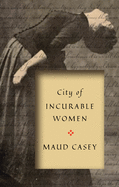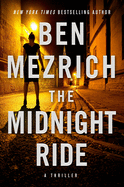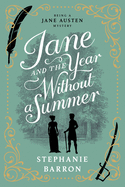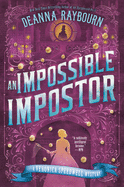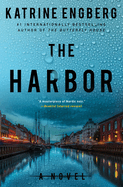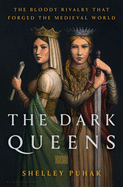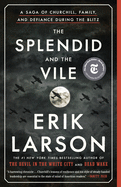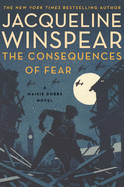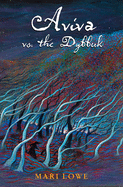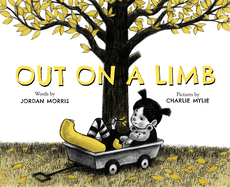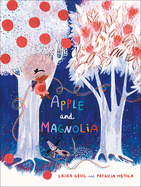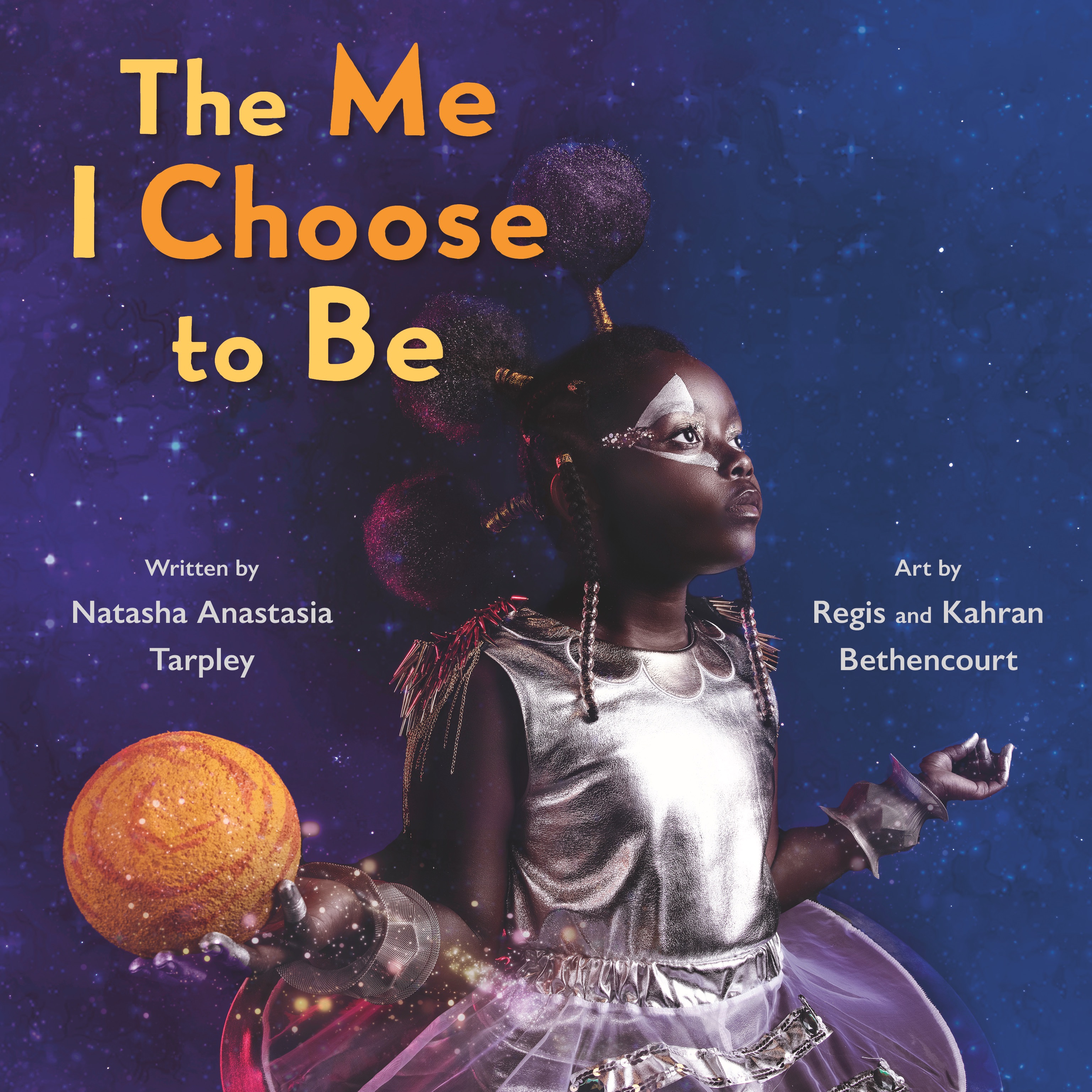 Natasha Anastasia Tarpley and Regis and Kahran Bethencourt teamed up for the picture book The Me I Choose to Be (Little, Brown Books for Young Readers, $17.99), for which the Bethencourts recently won the Coretta Scott King/John Steptoe New Talent Illustrator Award, the first photography winners for the award.
Natasha Anastasia Tarpley and Regis and Kahran Bethencourt teamed up for the picture book The Me I Choose to Be (Little, Brown Books for Young Readers, $17.99), for which the Bethencourts recently won the Coretta Scott King/John Steptoe New Talent Illustrator Award, the first photography winners for the award.
Natasha Anastasia Tarpley is the author of the picture books I Love My Hair! and The Me I Choose to Be. She is the recipient of a National Endowment for the Arts Fellowship, and is the cofounder of Voonderbar! Media, a project seeking to expand the depictions of children of color in media. She lives with her family in Chicago, Ill.
Regis and Kahran Bethencourt are the husband-and-wife duo and the imaginative forces behind CreativeSoul Photography. They specialize in child and lifestyle photography that incorporates authentic visual storytelling. They live in Atlanta, Ga.
Here, they discuss collaborating on their prize-winning picture book.
 |
Natasha Tarpley
(photo: Phil Stuggle) |
Regis and Kahran Bethencourt: What inspired you to create The Me I Choose to Be?
Natasha Tarpley: I see writing as a form of activism and as a tool to not only change the narrative around Black kids and other people of color, but also to nudge kids to take an active role in creating and telling their own stories and in creating change in their lives and communities. I am so thankful for the broad impact that my work has had. I receive feedback from readers from all over the world who tell me how much my work has meant to their lives. This is the ultimate form of praise and my motivation for continuing to do the work that I do.
Bethencourts: Can you tell us more about your writing process?
Tarpley: Sometimes, when I start a new project, I have a clear idea of what I want to achieve creatively and how I'm going to write the manuscript to manifest that vision. But the text has a way of evolving and shaping itself, "choosing" what it wants to be. I knew that you would be the illustrators and wanted the text to complement the imaginative and inspirational qualities of your photographic style. I decided to try writing the manuscript as a series of haikus--which I like because you can pack a lot of meaning and beauty in a small space--but it quickly became apparent that the text needed to be more free-flowing. I then cut the manuscript into individual lines, which I posted on the wall and physically re-arranged, picking out the ones that spoke to me most. The result was a series of lyrical verses that left room for readers to bring and explore their own imaginations, and for you to work your magic.
 |
Regis and Kahran Bethencourt
(D. Finney Photography) |
Speaking of... your images are stunning. Where did you get the styling inspiration for the costumes?
Bethencourts: We typically style most shoots ourselves, so once we had your text, we came up with mood boards for each page, which gave us an idea of the direction we wanted to go. From there, we worked with our talented team to help bring the vision to life. Our goal was to promote self-love and confidence, specifically for Black and brown children, and we love that we were able to create a picture book using photos of everyday Black and brown children in our creative style. Oftentimes picture books contain illustrated or fictional characters; using real kids gives readers a better sense of self-love and allows them to better picture themselves living out their own dreams.
Tarpley: I agree! I hope that children and all readers will be inspired to explore and be who they are, and to claim the power to define themselves for themselves, no matter what others might say. I also hope that children will understand that the process of self-discovery is an ever-evolving journey. We are always changing, growing, and if we happen to make a mistake along the way, we can pick ourselves up and begin again.
What message do you hope that children and families will take from the book?
Bethencourts: The book is an uplifting ode to the power of potential, and we hope that our imagery will show the power of resilience and dare children to dream. We often say that we are more than just photographers, and this book ties into our overall mission as photographers to empower kids of color around the world by showcasing their beauty, uniqueness and creativity. With this book, we were able to continue the journey of empowering our youth to dream big.
Tarpley: What was your favorite moment working on the book? Were there any challenges?
Bethencourts: Our favorite moments were working with so many amazing kids and being able to create "characters" for each of them. Kids are often full of surprises, so we'd get something totally unexpected (and sometimes much better) than we ever imagined. Our biggest obstacle was trying to develop scenery during post processing that would help to better tell the story. It often takes a few tries to get a look that complements the text perfectly.
Tarpley: I am a huge fan of your work. How do you use art to empower children, and what is it about these images that you think resonates with your audience?
Bethencourts: Art is a powerful tool for kids' empowerment because it's easily relatable and allows them to use their imagination beyond their own personal real-world experiences. We hope that kids will see our photos and feel confident, that they will be able to see themselves reflected in the book, which hopefully inspires them to not feel limited by societal standards. It is so important for kids of color to be able to see positive images that look like them in the media. Unfortunately, the lack of diversity often plays into the stereotypes that they are not "good enough" and often forces kids to have low self-esteem. We try to combat this by showing diverse imagery of kids who love the skin they're in, their own natural curls and their culture. These photos and stories are important to show to shatter existing stereotypes and invisible glass ceilings.
We are also fans of your work, and your books do a great job at showcasing Black excellence and beauty and bringing diversity to the genre. As a longtime author, what advice do you have for kids who want to become writers or creators?
Tarpley: Practice your craft: create something every day, even if it's terrible. Be curious and open to new and different experiences; explore your neighborhood or city as well as other cultures. This will give you lots of material to draw from in your creative work. Most importantly, believe in yourself and trust your voice and your work. It's very easy to get discouraged when you create work that is not always acknowledged by others, but you must know that what you're doing is important--your story is unique and it matters.
The Me I Choose to Be: Daring Children to Dream
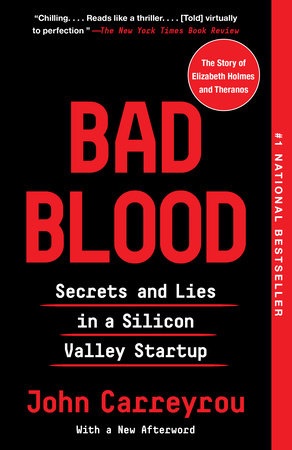 Silicon Valley and tech startups can seem like another world. Books like John Carreyrou's Bad Blood: Secrets and Lies in a Silicon Valley Startup (Vintage, $16.95) have provided fascinating, if unflattering, looks inside that world. The story of Elizabeth Holmes and Theranos proved unusual and shocking enough to catch Hollywood's attention; it inspired a documentary, a Hulu miniseries and a film starring Jennifer Lawrence. Holmes's meteoric rise and fall, for all of its strangeness, however, follows a familiar pattern of mercurial, charismatic founders and executives whose grandiose visions earned their companies seemingly endless venture capital funding, all while questions about the soundness of their businesses were largely ignored.
Silicon Valley and tech startups can seem like another world. Books like John Carreyrou's Bad Blood: Secrets and Lies in a Silicon Valley Startup (Vintage, $16.95) have provided fascinating, if unflattering, looks inside that world. The story of Elizabeth Holmes and Theranos proved unusual and shocking enough to catch Hollywood's attention; it inspired a documentary, a Hulu miniseries and a film starring Jennifer Lawrence. Holmes's meteoric rise and fall, for all of its strangeness, however, follows a familiar pattern of mercurial, charismatic founders and executives whose grandiose visions earned their companies seemingly endless venture capital funding, all while questions about the soundness of their businesses were largely ignored.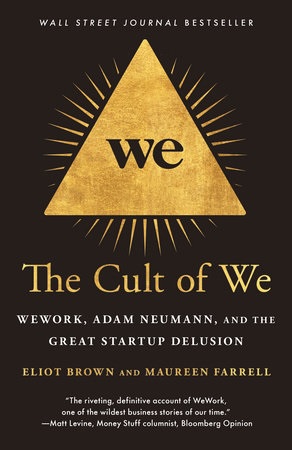 The Cult of We: WeWork, Adam Neumann, and the Great Startup Delusion by Eliot Brown and Maureen Farrell (Crown, $18) suggests in its title the frenzy of adulation that builds around companies like WeWork until reality finally intrudes. After the fact, media narratives often fixate on the more bizarre actions and pronouncements of headstrong founders like Adam Neumann, and it is easy in retrospect to view the rise and fall of once-promising startups as a kind of morality play.
The Cult of We: WeWork, Adam Neumann, and the Great Startup Delusion by Eliot Brown and Maureen Farrell (Crown, $18) suggests in its title the frenzy of adulation that builds around companies like WeWork until reality finally intrudes. After the fact, media narratives often fixate on the more bizarre actions and pronouncements of headstrong founders like Adam Neumann, and it is easy in retrospect to view the rise and fall of once-promising startups as a kind of morality play.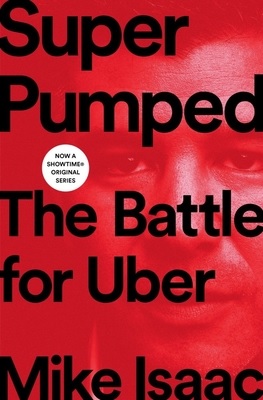 Books like The Cult of We and Bad Blood capture how the eccentricities of founders are normalized, or even seen as signs of prophetic genius, inside the startup world. As documented in Mike Isaac's Super Pumped: The Battle for Uber (W.W. Norton, $18.95), that doesn't mean that investors will maintain their patience forever. Uber and WeWork would eventually see their founders booted, their still-enormous companies going on without them. More disturbingly, the books end with few lessons learned and often plenty of money made by the people involved, leaving little doubt that startup messiahs will continue to flourish, likely inspiring another wave of books and movies after their promises fall short. --Hank Stephenson, manuscript reader, the Sun magazine
Books like The Cult of We and Bad Blood capture how the eccentricities of founders are normalized, or even seen as signs of prophetic genius, inside the startup world. As documented in Mike Isaac's Super Pumped: The Battle for Uber (W.W. Norton, $18.95), that doesn't mean that investors will maintain their patience forever. Uber and WeWork would eventually see their founders booted, their still-enormous companies going on without them. More disturbingly, the books end with few lessons learned and often plenty of money made by the people involved, leaving little doubt that startup messiahs will continue to flourish, likely inspiring another wave of books and movies after their promises fall short. --Hank Stephenson, manuscript reader, the Sun magazine


 Natasha Anastasia Tarpley and Regis and Kahran Bethencourt teamed up for the picture book
Natasha Anastasia Tarpley and Regis and Kahran Bethencourt teamed up for the picture book 

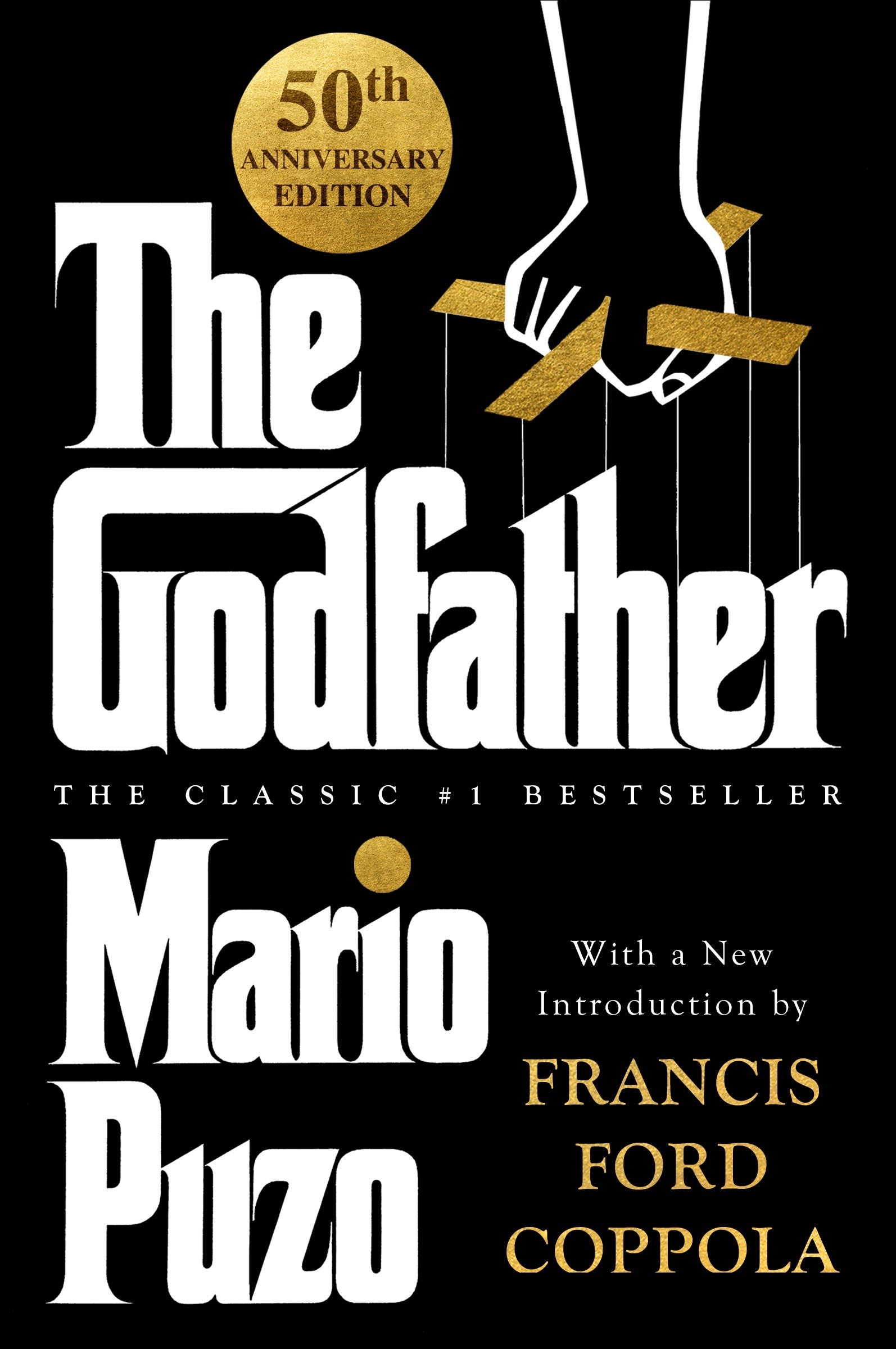 Mario Puzo's The Godfather turned 50 in 2019. The Sopranos and Goodfellas, among many other works, owe their existence to Puzo's depiction of Italian-American gangsters. Even words such as consigliere, caporegime, Cosa Nostra and omertà were unknown to most Americans before The Godfather. Both Puzo and Francis Ford Coppola adapted the book into a screenplay (for which they shared an Oscar). The film version of The Godfather is considered among the greatest movies of all time. Its sequels, Parts II and III, also included contributions from Puzo. Now, 50 years after the first film's 1972 premiere, Coppola and Paramount Studios are releasing a new restoration after some 4,000 hours of digital tinkering and repairing negatives. This version opens in theaters today, February 25, and will be available on home video March 22.
Mario Puzo's The Godfather turned 50 in 2019. The Sopranos and Goodfellas, among many other works, owe their existence to Puzo's depiction of Italian-American gangsters. Even words such as consigliere, caporegime, Cosa Nostra and omertà were unknown to most Americans before The Godfather. Both Puzo and Francis Ford Coppola adapted the book into a screenplay (for which they shared an Oscar). The film version of The Godfather is considered among the greatest movies of all time. Its sequels, Parts II and III, also included contributions from Puzo. Now, 50 years after the first film's 1972 premiere, Coppola and Paramount Studios are releasing a new restoration after some 4,000 hours of digital tinkering and repairing negatives. This version opens in theaters today, February 25, and will be available on home video March 22.
